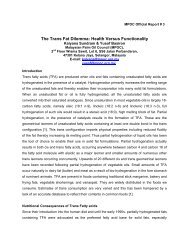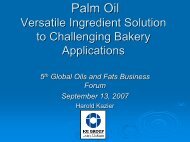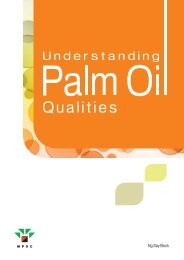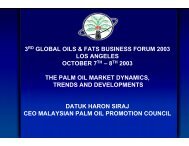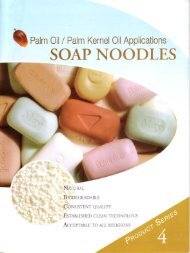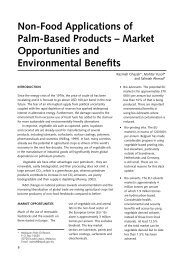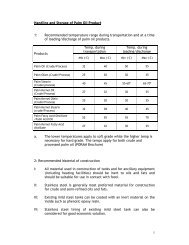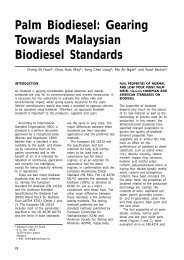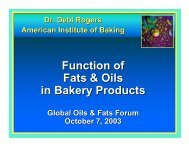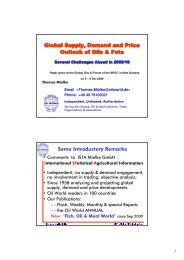You also want an ePaper? Increase the reach of your titles
YUMPU automatically turns print PDFs into web optimized ePapers that Google loves.
Consuming hydrogenated oils can leadto EFA deficiency, a symptom of whichis elevated cholesterol – a risk factor forheart disease. Hydrogenated fats notonly raise total cholesterol but also LDL(the so-called bad cholesterol) andlowers HDL (the ‘good’ cholesterol).TFA block prostaglandin synthesis whichleads to hormonal imbalance, stuntstesticular development in the young, andhave been observed to cause testiculardegeneration in mature animals.In the diet, TFA are incorporated intocells and alter composition of tissuesthroughout the body. Higher levels of fataccumulate in the heart, liver and otherorgans. TFA also retard kidneydevelopment, stunt growth and interferewith blood sugar metabolism.Nursing mothers who consumehydrogenated oils pass TFA to theirchildren through breast milk. TFA arefurther found to contribute to low birthweight babies, visual abnormalities ininfants, childhood asthma, reproductivedysfunction, obesity and lowerimmunity.Simple solutionMuch of this was known and available inpublished studies by the mid-1980s, evenbefore the vegetable oil industry startedits anti-saturated fat campaign and thepush to replace tropical oils withhydrogenated oil.This explains why industryrepresentatives always alluded toreplacing saturated fats with ‘vegetable’ oilrather than ‘hydrogenated vegetable’ oil. Ifthe public knew that the industry wasplanning on using hydrogenated oils, itwould have had a bigger fight on itshands.How did they get away with it? Thevegetable oil and pharmaceuticalindustries fund a great deal of research.Concerned about unfavourablefindings that began surfacing in the1950s and 1960s, they began countermeasuresto show that hydrogenatedfats were safe.They especially didn’t want hydrogenatedoils implicated as a possible cause ofheart disease. They financed studies toshow that hydrogenated oils wereharmless to the heart and circulatorysystem. Negative findings were ignoredand even suppressed.Researchers depend on fundingorganisations to finance their work andadvance their careers. Consequently,most researchers are highly motivated toproduce good results and ignoreunfavourable information. Those whohave attempted to publicise negativeeffects are faced with denial of financialassistance and being ostracised by otherfunding organisations.For example, When Mary Enig, PhD, anoted researcher and co- founder of theWeston A Price Foundation, discoveredthe harmful effects of TFA, she ignoredthe normal protocol of suppressing theinformation and published anyway. Herfinancial backers withdrew support andall future funding dried up. She waslabelled a troublemaker and shunned bythe vegetable oil industry. She was forcedto make a shift in her career plans.The idea of a researcher searching fortruth, regardless of the consequences,apparently no longer applies. Similar tothe tobacco industry, the vegetable oilindustry suppressed studies and hidevidence. But just as evidence linking lungcancer and tobacco mounted, so too didthe evidence against hydrogenatedvegetable oils.Now that hydrogenated vegetable oilshave been exposed as health hazards,food manufacturers are removing thesefrom products.So what’s the solution to hydrogenatedfats? There is a simple answer. What didfood manufacturers and restaurants usebefore they had hydrogenated oils?Saturated fats – and one of the best forcooking is palm oil.Dr Bruce FifeAuthor, The <strong>Palm</strong> <strong>Oil</strong> MiracleThis is an edited chapter from the bookpublished in 2007.GLOBAL OILS & FATS BUSINESS MAGAZINE • VOL.5 ISSUE 1, 200827



